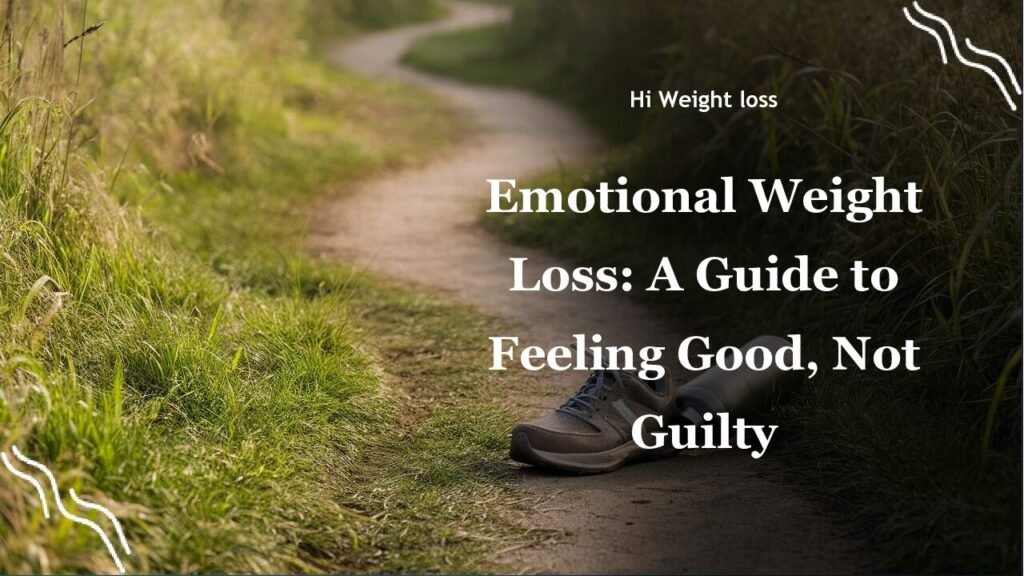“`
Losing weight can be an emotional rollercoaster, and it’s completely normal to experience feelings of guilt or sadness during the process. The good news is, you don’t have to feel bad while striving for a healthier you. This article will delve into strategies for managing the emotional side of weight loss, ensuring that you can achieve your goals while maintaining a positive mindset. We’ll explore how to change your relationship with food, manage self-comparison, and build a sustainable approach that focuses on overall wellness.
How to Navigate the Emotional Aspects of Weight Loss
The Importance of a Sustainable Approach to Weight Loss
Have you ever jumped into a new diet with both feet, only to feel overwhelmed by the sudden changes? This feeling is common. A gradual approach to weight loss is key. It allows your body to adapt to changes, reducing the likelihood of negative emotional responses. Think of it as a marathon, not a sprint. A sustainable approach helps you avoid the emotional pitfalls of rapid change.
Avoid Comparisons: Your Journey is Unique
It’s so easy to scroll through social media and see seemingly perfect bodies, isn’t it? But constantly comparing yourself to others can lead to feelings of inadequacy and guilt, particularly during your weight loss journey. Focus on your own progress. Confidence should come from within, and learning to cope with physical changes is part of the journey. One of my friends, Sarah, found that journaling about her own achievements, rather than focusing on other’s, made a huge difference in her confidence.
Seeking Psychological Support
Losing weight is not just a physical process. It’s important to address the emotional aspect. Including a psychologist or counselor in your healthcare team can help navigate the emotional effects of weight loss. They can provide tools to ensure that you are mentally prepared for the process and can recognize yourself through the changes. When I was going through a difficult time during my own weight loss, talking to a therapist was incredibly helpful. It provided a safe space for me to address the emotions I was struggling with.
Changing Your Relationship with Food
Instead of seeing food as the enemy, try shifting your mindset. Why do you eat when you’re not hungry? Are you stressed, bored, or celebrating? It is critical to change your relationship with food, focusing on why you’re eating rather than just what you’re eating. This helps develop the right mindset and healthy habits necessary for long-term weight loss. Understanding your triggers is a crucial step.
The Power of Daily Accountability and Support
Daily accountability and support can significantly help you stick to your weight loss plan. Find a coach who is an expert and who can provide relentless support and guidance. Having a support system, be it from friends, family, or a professional, can make all the difference. When I had to face some challenges on this journey, my support group helped me stay motivated. Having someone to be accountable to made it easier to adhere to my plans.
Emotional Preparation: It’s More Than Just Physical
Dramatic weight loss is not just a physical adjustment; it’s also a psychologically complex process. Be aware that it may not always bring about as much happiness as expected, and it’s normal to experience low self-esteem or feelings of vulnerability. It’s a journey of self-discovery. It’s okay if you don’t always feel great; that’s part of the process. Emotional preparation will allow you to deal with any challenges that come up.

Adjusting Your Lifestyle: Focus on Wellness, Not Just the Number
Think of losing and maintaining a healthy weight as a lifestyle change, not a temporary fix. Focus on wellness rather than just the number on the scale. This helps reduce feelings of isolation, loneliness, and biases associated with weight loss. It’s about adopting a healthy lifestyle that includes balanced nutrition, regular exercise, and, importantly, a positive mindset. By focusing on overall wellness, you’re more likely to achieve long-term success and avoid the emotional pitfalls of obsessing over numbers. For instance, when I started focusing on how good I felt after exercise rather than how many pounds I lost, my whole approach became more positive. I found that by focusing on feeling good rather than just weight, my body changed in ways that made me happy. This was so much better than worrying about a number on the scale.
Here is a table summarizing some key strategies to avoid feeling bad during weight loss:
| Strategy | Description | Benefit |
|---|---|---|
| Gradual Approach | Slow, steady weight loss | Minimizes emotional impact |
| Self-Focus | Avoid comparisons; focus on your progress | Builds confidence |
| Psychological Support | Counseling or therapy | Navigates emotional challenges |
| Mindset Shift | Change relationship with food | Develops healthy eating habits |
| Accountability and Support | Daily check-ins with a coach or support system | Maintains consistency |
| Emotional Preparation | Understand the process is more than physical | Handles emotional ups and downs |
| Lifestyle Adjustment | Focus on wellness, not just weight | Promotes long-term health and happiness |
Conclusion
Losing weight doesn’t have to be a negative experience filled with guilt and sadness. By focusing on a gradual, sustainable approach, avoiding comparisons, and seeking psychological support when needed, you can achieve your weight loss goals while maintaining a positive mindset. Remember, it’s vital to change your relationship with food, understand that this is more than a physical journey, and adjust your lifestyle to prioritize overall wellness. Ultimately, your well-being should always be at the forefront. Share this article with anyone who might be struggling with the emotional side of weight loss, and let’s support each other on the path to a healthier and happier life. Your story, just like Sarah’s, can be one of success and positivity if you nurture the emotional aspects of your journey.
FAQ
How can I stop feeling guilty about losing weight?
Focus on the positive changes in your health and well-being, rather than just the number on the scale. Celebrate your progress, no matter how small. Engage in activities that nurture a positive relationship with yourself and your body.
What are some tips for dealing with weight loss guilt?
Practice self-compassion, treat yourself kindly. Avoid negative self-talk and focus on what you have achieved. Consider talking to a therapist or counselor for guidance and support to manage the emotions associated with change.
How can I overcome guilt when losing weight naturally?
Losing weight naturally and sustainably is a great achievement! Refocus your thinking on positive lifestyle changes, such as increased physical activity and improved nutrition. Be patient with the process and understand that progress takes time and consistency.
Is it normal to feel sad while losing weight?
Yes, it’s completely normal to feel a range of emotions, including sadness. Weight loss is a complex journey that can trigger various emotional responses. Acknowledge and validate those feelings and seek professional support if they become overwhelming.
What does ‘sustainable’ weight loss actually mean?
Sustainable weight loss focuses on making gradual and manageable changes to your diet and lifestyle. It’s not about quick fixes or extreme measures but about creating healthy habits that you can maintain long-term.
“`



